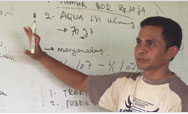The peer educator program at Egypt’s Minia University is just one of many activities designed by USAID to increase young people’s access to quality family planning and reproductive health services throughout Upper Egypt. In collaboration with Minia University, the project uses a participatory approach that has been successfully implemented in other countries to support ongoing education and outreach.
With this assistance, peer educators can provide appropriate information to youth individually, through special events or by referring them to family planning and reproductive health professionals. At one peer educator workshop, health professionals delivered presentations on the male and female reproductive systems, reproductive tract infections and sexually transmitted diseases, the premarital concerns of young people, fertility and family planning, counseling, and communication skills.
Now a peer educator herself, before joining the program, 17-year-old Marwa Mukhtar thought pain medication to fight cramps caused infertility, and had never heard of a condom. Today, she shares her newfound knowledge about reproductive health with her friends, sisters, cousins—even her mother. She says that now she wants to become a reproductive health educator when she gets older.
|


